Urgency scientific expedition to assess climate induced death of coral reefs
A team of scientists led by a �鶹�� professor have recently returned from a scientific expedition to the remote and largely uninhabited Chagos Archipelago in the British Indian Ocean Territory (BIOT).
Professor John Turner from �鶹��’s School of Ocean Sciences, led the team of 14 scientists which included Dr Ronan Roche, also from �鶹��, and others from the University of Oxford, Zoological Society of London, University College of London, Scottish Association of Marine Science and an oceanographic instrument company.
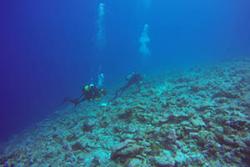 Dead shallow reef We’ve all heard of the devastating effects climate change induced sea temperature rise has had on Australia’s Great Barrier Reef but unfortunately this is a global problem and the reefs of the Chagos Archipelago have not been spared. Just like corals elsewhere, the warm temperatures cause the corals to expel the microalgae that live within them, making the structures look white in colour. Without the microalgae, the corals are unable to photosynthesise and may starve and die.
Dead shallow reef We’ve all heard of the devastating effects climate change induced sea temperature rise has had on Australia’s Great Barrier Reef but unfortunately this is a global problem and the reefs of the Chagos Archipelago have not been spared. Just like corals elsewhere, the warm temperatures cause the corals to expel the microalgae that live within them, making the structures look white in colour. Without the microalgae, the corals are unable to photosynthesise and may starve and die.
The British Indian Territory (BIOT) is one of the World’s largest marine protected areas, covering some 640,000 km2 of ocean (an area the size of France), a wilderness uninhabited for ~60 years and containing some of the world’s best coral reefs and significant populations of 76 IUCN Red List species, including sharks, turtles and seabirds. The Chagos Marine Reserve serves as a global reference site, providing a benchmark for reversing damaged ecosystems elsewhere, and serves as a refuge for species that reseed degraded parts of an ocean on which millions of people depend.
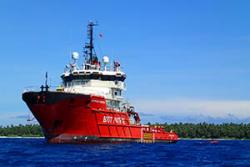 Patrol vessel Grampian FrontierFor a period of three weeks, the team were aboard the territory’s impressive Patrol Vessel, the Grampian Frontier to investigate the effects of two major warming events in two years that caused the coral reefs to bleach.
Patrol vessel Grampian FrontierFor a period of three weeks, the team were aboard the territory’s impressive Patrol Vessel, the Grampian Frontier to investigate the effects of two major warming events in two years that caused the coral reefs to bleach.
Professor John Turner stated: “We want to know whether the reefs, which have previously proved to be resilient, are showing extensive mortality or signs of recovery.”
The expedition undertook coral reef assessments around three remote coral atolls and a clear pattern emerged from their observations. They dived a mixture of exposed seaward reefs, leeward lagoon reefs and patch reefs to a depth of 25m, and report that nearly all corals above 15m depth have died.
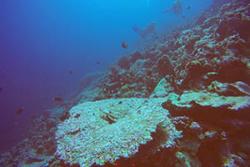 A dead table coral upon which new coral settleMany of the large table corals that provide complexity to the reef structure, not unlike a forest’s canopy, have collapsed, although these will eventually become cemented together, and form a surface for new corals to grow. In more exposed locations, the coral tables have fallen down the reef slope, often being overturned, and in very exposed sites, they have been swept off the reef entirely, taking the newly settled young corals with them.
A dead table coral upon which new coral settleMany of the large table corals that provide complexity to the reef structure, not unlike a forest’s canopy, have collapsed, although these will eventually become cemented together, and form a surface for new corals to grow. In more exposed locations, the coral tables have fallen down the reef slope, often being overturned, and in very exposed sites, they have been swept off the reef entirely, taking the newly settled young corals with them.
The only corals surviving in the shallows are the large rounded colonies of a coral called Porites many of which are extremely large (>5m diameter) and could be many hundreds of years old. A different picture emerges at deeper depths, where coral communities are generally still in good health. 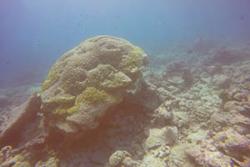 Porites corals are one of the few surviving coral species in shallow watersBelow 15m on seaward reef slopes and lagoon (leeward) reefs, most corals are surviving, although some instances of partial bleaching and mortality are evident. Noticeable on exposed seaward reefs are colder water upsurges that may be helping to cool these corals.
Porites corals are one of the few surviving coral species in shallow watersBelow 15m on seaward reef slopes and lagoon (leeward) reefs, most corals are surviving, although some instances of partial bleaching and mortality are evident. Noticeable on exposed seaward reefs are colder water upsurges that may be helping to cool these corals.
So, the bad news so far is that there has been substantial mortality of corals in shallow water. The good news is that corals at deeper depths appear to be surviving and may be a refuge, potentially providing new generations of coral. At present, there is still a complex structure provided by dead standing corals in shallow water, which provides habitat for some fish, but this will erode and the longer term impact on fish communities is unknown.
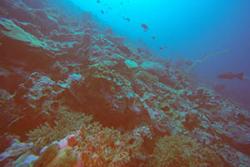 Healthier corals in deeper waterProfessor Turner reported: “We are obviously saddened to see the coral reefs of Chagos in this state, which is no different to that of other climate affected locations such as the Great Barrier Reef, but remain optimistic that these reefs, protected and remote from human impacts, can still bounce back as they did after the 1997/98 warming event.
Healthier corals in deeper waterProfessor Turner reported: “We are obviously saddened to see the coral reefs of Chagos in this state, which is no different to that of other climate affected locations such as the Great Barrier Reef, but remain optimistic that these reefs, protected and remote from human impacts, can still bounce back as they did after the 1997/98 warming event.
“A highlight of the expedition was an encounter with a Thresher shark, a Red List Threatened oceanic shark that visits coral reefs to be cleaned of parasites but which has not been seen in Chagos before.
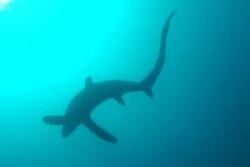 A Pelagic Thresher Shark"The shark was surprised as I was, and used a flick of its immense tail to speed away into the blue. Our previous research has shown how these sharks can use their tail to stun fish.”
A Pelagic Thresher Shark"The shark was surprised as I was, and used a flick of its immense tail to speed away into the blue. Our previous research has shown how these sharks can use their tail to stun fish.”
This project is fully funded by the through the , working with leading marine scientists from across the world to carry out a programme of long-term research on the Chagos Marine Protected Area. Professor Turner’s team have been awarded a generous Foundation grant to continue to investigate the consequences of coral bleaching and recovery potential of these reefs.
Publication date: 12 May 2017
